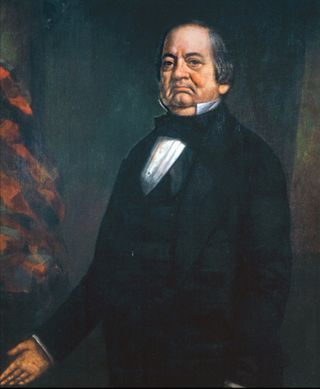
Marcus Morton was an American lawyer, jurist, and politician from Taunton, Massachusetts. He served two terms as the governor of Massachusetts and several months as Acting Governor following the death in 1825 of William Eustis. He served for 15 years as an associate justice of the Massachusetts Supreme Judicial Court, all the while running unsuccessfully as a Democrat for governor. He finally won the 1839 election, acquiring exactly the number of votes required for a majority win over Edward Everett. After losing the 1840 and 1841 elections, he was elected in a narrow victory in 1842.

John Davis was an American lawyer, businessman and politician from Massachusetts. He spent 25 years in public service, serving in both houses of the United States Congress and for three non-consecutive years as Governor of Massachusetts. Because of his reputation for personal integrity he was known as "Honest John" Davis.

Levi Lincoln Jr. was an American lawyer and politician from Worcester, Massachusetts. He was the 13th governor of Massachusetts (1825–1834) and represented the state in the U.S. Congress (1834–1841). Lincoln's nine-year tenure as governor is the longest consecutive service in state history; only Michael Dukakis, John Hancock and Caleb Strong served more years, but they were not consecutive.

George Nixon Briggs was an American lawyer and politician from Massachusetts. A Whig, Briggs served for twelve years in the United States House of Representatives, and served seven one-year terms as the 19th Governor of Massachusetts, from 1844 to 1851.

The 1844 Whig National Convention was a presidential nominating convention held on May 1, 1844, at Universalist Church in Baltimore, Maryland. It nominated the Whig Party's candidates for president and vice president in the 1844 election. The convention selected former Senator Henry Clay of Kentucky for president and former Senator Theodore Frelinghuysen of New Jersey for vice president.

Robert Perkins Letcher was a politician and lawyer from the US state of Kentucky. He served as a U.S. Representative, Minister to Mexico, and the 15th Governor of Kentucky. He also served in the Kentucky General Assembly where he was Speaker of the House in 1837 and 1838. A strong supporter of the Whig Party, he was a friend of Henry Clay and John J. Crittenden.
George Hull was an American, merchant, businessman, and politician from Massachusetts. A prominent shop owner in Sandisfield, Massachusetts, he served as the 15th lieutenant governor of Massachusetts from 1836 through 1843.

The 1840–41 United States Senate elections were held on various dates in various states. As these U.S. Senate elections were prior to the ratification of the Seventeenth Amendment in 1913, senators were chosen by state legislatures. Senators were elected over a wide range of time throughout 1840 and 1841, and a seat may have been filled months late or remained vacant due to legislative deadlock. In these elections, terms were up for the senators in Class 2.

The 1839 Massachusetts gubernatorial election was a tightly contested race won by Marcus Morton. Under Massachusetts law at the time, a majority of the votes cast was required to win, and Morton received exactly half the votes cast. Despite the presence of some irregularities, incumbent Whig governor Edward Everett refused to contest the results once a legislative committee dominated by his party accepted a report giving Morton 51,034 votes out of 102,066 cast.

The 1840 Massachusetts gubernatorial election was held on November 9.

The 1838 Massachusetts gubernatorial election was held on November 12.

The 1837 Massachusetts gubernatorial election was held on November 13.

The 1836 Massachusetts gubernatorial election was held on November 14.

The 1835 Massachusetts gubernatorial election was held on November 9.

The 1834 Massachusetts gubernatorial election was held on November 10.

The 1830 Massachusetts gubernatorial election was held on April 5.

The second 1831 Massachusetts gubernatorial election was held on November 14.

The 1833–34 Massachusetts gubernatorial election consisted of a popular election held on November 11, 1833 and a legislative vote held in January 1834. The task of electing the governor fell to the Massachusetts General Court because no candidate received the constitutionally required majority of the popular vote.

The 1842 Massachusetts gubernatorial election consisted of an initial popular election held on November 14, 1842 that was followed by a legislative vote held on January 17, 1843. The ultimate task of electing the governor had been placed before the Massachusetts General Court because no candidate received the majority of the vote that was constitutionally required for a candidate to be elected through the popular election. Incumbent Whig Governor John Davis was defeated by Democratic nominee and former Governor Marcus Morton.

The 1843–44 Massachusetts gubernatorial election consisted of an initial popular election held on November 13, 1843, that was followed by a legislative vote held on January 8, 1844. The ultimate task of electing the governor had been placed before the Massachusetts General Court because no candidate received the majority of the vote that was constitutionally required for a candidate to be elected through the popular election. Incumbent Democratic Governor Marcus Morton was defeated by Whig Party nominee George N. Briggs.






















